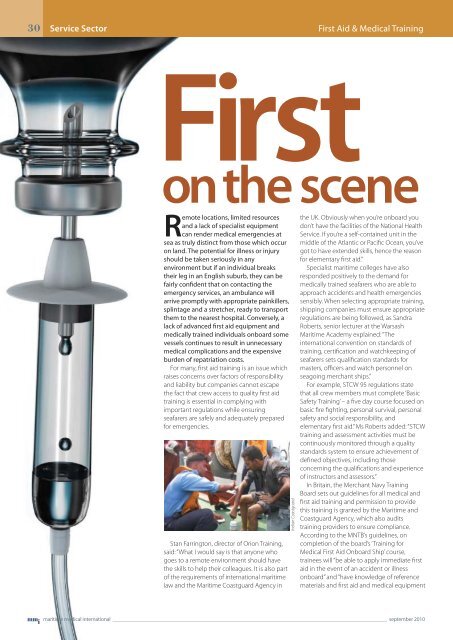You also want an ePaper? Increase the reach of your titles
YUMPU automatically turns print PDFs into web optimized ePapers that Google loves.
30 Service Sector First Aid & Medical Training<br />
First<br />
on the scene<br />
Remote locations, limited resources<br />
and a lack of specialist equipment<br />
can render medical emergencies at<br />
sea as truly distinct from those which occur<br />
on land. The potential for illness or injury<br />
should be taken seriously in any<br />
environment but if an individual breaks<br />
their leg in an English suburb, they can be<br />
fairly confident that on contacting the<br />
emergency services, an ambulance will<br />
arrive promptly with appropriate painkillers,<br />
splintage and a stretcher, ready to transport<br />
them to the nearest hospital. Conversely, a<br />
lack of advanced first aid equipment and<br />
medically trained individuals onboard some<br />
vessels continues to result in unnecessary<br />
medical complications and the expensive<br />
burden of repatriation costs.<br />
For many, first aid training is an issue which<br />
raises concerns over factors of responsibility<br />
and liability but companies cannot escape<br />
the fact that crew access to quality first aid<br />
training is essential in complying with<br />
important regulations while ensuring<br />
seafarers are safely and adequately prepared<br />
for emergencies.<br />
Stan Farrington, director of Orion Training,<br />
said: “What I would say is that anyone who<br />
goes to a remote environment should have<br />
the skills to help their colleagues. It is also part<br />
of the requirements of international maritime<br />
law and the Maritime Coastguard Agency in<br />
Indian Coastguard<br />
the UK. Obviously when you’re onboard you<br />
don’t have the facilities of the National Health<br />
Service. If you’re a self-contained unit in the<br />
middle of the Atlantic or Pacific Ocean, you’ve<br />
got to have extended skills, hence the reason<br />
for elementary first aid.”<br />
Specialist maritime colleges have also<br />
responded positively to the demand for<br />
medically trained seafarers who are able to<br />
approach accidents and health emergencies<br />
sensibly. When selecting appropriate training,<br />
shipping companies must ensure appropriate<br />
regulations are being followed, as Sandra<br />
Roberts, senior lecturer at the Warsash<br />
Maritime Academy explained: “The<br />
international convention on standards of<br />
training, certification and watchkeeping of<br />
seafarers sets qualification standards for<br />
masters, officers and watch personnel on<br />
seagoing merchant ships.”<br />
For example, STCW 95 regulations state<br />
that all crew members must complete ‘Basic<br />
Safety Training’ – a five day course focused on<br />
basic fire fighting, personal survival, personal<br />
safety and social responsibility, and<br />
elementary first aid.” Ms Roberts added: “STCW<br />
training and assessment activities must be<br />
continuously monitored through a quality<br />
standards system to ensure achievement of<br />
defined objectives, including those<br />
concerning the qualifications and experience<br />
of instructors and assessors.”<br />
In Britain, the Merchant Navy Training<br />
Board sets out guidelines for all medical and<br />
first aid training and permission to provide<br />
this training is granted by the Maritime and<br />
Coastguard Agency, which also audits<br />
training providers to ensure compliance.<br />
According to the MNTB’s guidelines, on<br />
completion of the board’s ‘Training for<br />
Medical First Aid Onboard Ship’ course,<br />
trainees will “be able to apply immediate first<br />
aid in the event of an accident or illness<br />
onboard” and “have knowledge of reference<br />
materials and first aid and medical equipment<br />
maritime medical international ________________________________________________________________________________________________________ september <strong>2010</strong>


